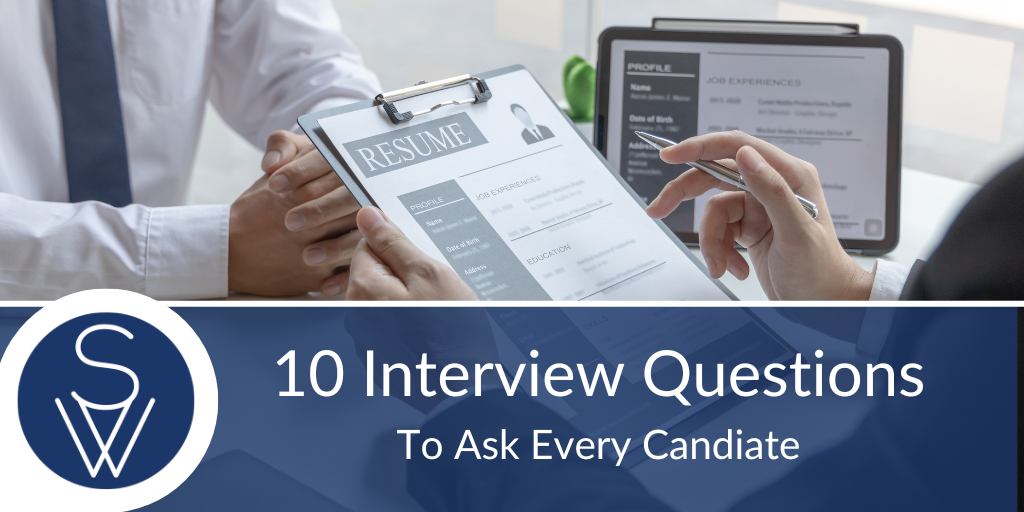Reveal a Job Candidate’s True Capabilities

5 Hard-Hitting Behavioral Interview Questions:
These questions help you dig past big claims on a resume, like “successfully led” and “increased revenue by $3.7 million,” by asking for specifics like “how did you do that?”
"How did you do that?"
Listen for: Specific Actions, Steps Taken, and Skills Applied
If your candidate truly drove those results, they should be able to tell you what, exactly, they did to achieve them. Beware the candidate who drowns you in platitudes like, I believe in motivating great sales by rewarding great salespeople.” Uh, what does that mean? Find out with a follow-up. “I like hearing that. But I’d like to get a clear picture of all the steps you took to motivate the team – plus any other key steps you took to drive such impressive results.” Sooner or later, the candidate will either articulate meaningful actions they took or they’ll just keep recycling the same, meaningless headlines.
"Tell me about a time when you had to collaborate with a difficult coworker."
Listen for: Personal Flexibility, Conflict Resolution Skills, and Professionalism
Your dream candidate doesn’t need to be besties with everyone on your team. But they do need to work productively and professionally with everyone. If, for example, the candidate proceeds to tell you a long yarn about “a total idiot that should have been fired but never was,” there’s a problem. Likewise, if they try to sell you on the idea that they “have never experienced that challenge,” they’re either lying to you or they’re ill-equipped to actually deal with difficult people.
A great response will include examples of valuing people’s skills and goals, compromising where appropriate, and the ability to adapt their own process for the good of the team’s objectives.
"Describe a time when you had to convince a manager to change something."
Listen for: Influencing skills, Fact-based Communications, Professionalism
You want your new hire to know that you need them to come to you with new ideas. You also need to know that they’ll communicate respectfully and come to you with fact-based requests. Put more simply: you don’t want whiners, bullies or backstabbers.
A great response will demonstrate the candidate’s negotiating skills and experience with referencing compelling facts to influence the decisions of others.
"Tell me about a time when you were at risk of missing a deadline. What did you do?"
Listen for: Planning and Prioritization skills, the Ability to Work Under Pressure
This is a great way to get a feel for how the candidate assesses projects, delegates tasks, and deals with pressure. It’s also a great window on their level of flexibility.
A great response will show you that this candidate is able to juggle competing priorities and remain completely transparent with their management about how things stand, where risks exist, and where they might need to ask for extra help.
"Tell me about an incident when you received corrective feedback that wasn’t necessarily fair or accurate."
Listen for: Personal Reflection and Accountability, the Ability to Learn from Mistakes, Integrity
A great response will reassure you that this is someone who can respectfully hear corrective feedback – even if it’s inaccurate – without going into a tizzy. Ideally, your candidate will detail a time when a coworker or manager suggested they’d missed the mark on an assignment or failed to turn in the right thing. A hyper-defensive candidate might describe an angry confrontation or silent, seething anger. Naturally, neither of those responses bode well for you or your team. Instead, listen for someone who tells you about listening carefully, stepping back, and assessing why the feedback surprised them, and how they ultimately bridged the disconnects between their understanding and that of their colleague. And finally, what steps did they take to prevent those misunderstandings going forward? Keep in mind, you’re not seeking someone who’s perfect. You’re seeking someone who is talented, trustworthy, and committed to doing a great job for your team.
5 In-Depth Situational Interview Questions:
Unlike the above behavioral questions that dig for examples of past successes, the following questions use real-life challenges that exist within your department to gauge how effectively the candidate will approach them.
"Planning a new product introduction is a long process. How would you keep your team motivated and engaged throughout?"
Listen for: Leadership Skills, Recognition, and other Employee Engagement practices, and use of Data to Set Meaningful Goals
A great response will start with clarifying questions. (Don’t you want a candidate who wants a solid understanding of the situation before they go about diagnosing a solution?) You also want to hear answers that tie your future situation to something they’ve already done successfully in the past.
"We’re a fast-growing department within a fast-growing company. Often, we’re taking on challenges that are new to all of us. How would you handle being asked to take on something that you know is outside your skill set?"
Listen for: Self Awareness, a Willingness to Stretch, Honesty, and Clear Communications
A great response will reveal a candidate capable of solid, accurate self-assessment. Notice that the question asks only about skills. You want a candidate who is eager to learn take on new challenges and acquire the skills necessary to conquer them – but who is perfectly comfortable being honest with you about core competencies they may not possess. For example, a top-notch financial analyst will be excited to take on a new challenge that involves numbers. But if they turn into wooden dolls when speaking with small groups, they’d be the wrong person to be the keynote speaker at the next employee recognition event.
If you’re looking to hire a key player in a critical department, you need someone who demonstrates that all-important balance of optimism and realism when it comes to their own skills and competencies.
"How would you handle a situation where you made a mistake that affected a client?"
Listen for: Honesty, Personal Accountability, and Acute Sensitivity to Client Relationships
A great response will include details on how the candidate would assess the extent to which the client relationship may have been affected, how they would communicate an appropriate explanation and/or apology to the client, and how they would determine the steps necessary to prevent similar mistakes going forward.
"How would you handle an escalated complaint from a customer when you know the problem is their fault, not ours?"
Listen for: Integrity, Respect, Superior De-escalation Skills
A great response will highlight the importance of listening with empathy, a desire to build and maintain trust, and focus on finding solutions, not placing blame.
"What would you do if you discover that someone on your team isn’t performing up to standards or expectations?"
Listen for: Ownership of Team Performance, Performance Assessment Skills that are based on both Results and Efforts
A great response will include the candidate’s use of reasonable performance goals, consistently measuring performance by referring to data and personal observation, and clear communications. Because your employer brand depends on how well every manager and supervisor treats your employees, you need to see evidence that this candidate can empathize with underperforming employees and is capable of understanding the difference between temporary issues and a fundamental poor fit for the job.
Need help screening your candidates?
Contact a SkyWater Search Partner for help sourcing and pre-screening top talent.








